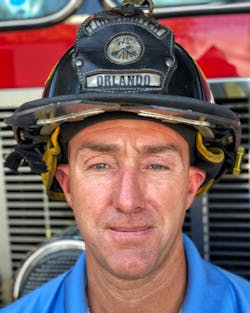The Confusion & Frustration of the Non-the-Job Injury
Looking back, I’d tell young firefighters, with age comes wisdom. You can’t get it from a book. You need time and years of doing dumb stuff to gain wisdom. That’s my theory at least. We’ve all done it, and you will do it as well. Just take notes along the way and try to learn from it.
Body breakdown
For example, in my younger days as a firefighter, I would naively look down on “so and so” for not wanting to work at station “such and such” because of his bad knees. “The stairs kicked my ass,” he would say about working at a particular station. I recall thinking, “Well, maybe this isn’t the job for you anymore, and your knees aren’t my problem.”
Clearly, I overlooked the sacrifices he had made over the years, and the toll that the job had taken on his body—an arrogance afforded to me by an able body and the callousness of youth. This was even more apparent to me recently when I found myself thinking about my current arm injury, how I am getting older in the fire service, and yet how I am still at the gym, working out to stay in shape for the job.
Over the years, I have taken the physical side of the job very serious, as you should. Maybe it’s my ADD, but I’ve never obsessed over door construction or stories of the “good ol’ days,” although I respect those who do. I just wanted to be the guy who could chew through a door.
I’ll never forget years ago during a training exercise, a firefighter who is now a chief said, “This is an athletic job; you need to be and train as athletes.” Although we probably didn’t agree on much philosophically, fundamentally I agree wholeheartedly with that ideology, and I respected that side of him.
For 18 years now, I have trained as an athlete. Not for “beach muscles” but rather for stamina, strength and agility—and I’m beginning to fall apart because of it. But that’s OK. I will train around my injuries like any good, aging athlete, up until the joint above this one becomes compromised, and then I’ll train around that one too, because, like you, I have a job to do. I will save the mental fallout for another chapter.
Doctors and duty
The annoying part for me, though, has become the conversations with the doctors and the billing department. Those conversations typically go something like this: “Yes, doctor, it is an on-the-job injury, but, no, it is not workers comp. You see, doc, the injuries occurred preparing to be on the job, and staying in shape to physically do the job, but, no, they did not actually occur at or on-the-job site. Yes, doctor, I know there is no insurance billing code for that. Hey, doc, how about you just code it as a ‘NON-the-job injury’? Get it? On the job, but not on the job? Nevermind, sure, just check ‘sports injury’ for billing purposes, that’s fine, doc.”
An injury could mean the loss of a firefighter’s career and livelihood. Many of us do not have insurance after retirement to cover years of service and these NON-the-job injuries. We train for the days we’re on the job; that’s what we do. No need for sympathy, though, as we all have trials and tribulations associated with our jobs.
Some departments do not allow Firefighters the opportunity to work in a Light Duty” status. Currently at our department; firefighters with an off duty injury can request to work in a light duty capacity, provided the Fire Chief feels there is a support position available, with the Fire Chief having the final authority to grant or deny such a request. The last department I worked at, there was no light duty for off-the-job injuries as well, and that is the case at many departments nationwide.
I know this issue is fiscally driven, as city leaders probably think that it is cheaper to hire a new guy at 1X value to replace an older firefighter being paid 3X. The solution, in my opinion, is within: showing city officials the cost-effectiveness of taking care of and retaining aging firefighters, over losing them to injuries and hiring/training new members to take their place.
A message
A message to the young firefighters: Have a little compassion for the older firefighters. And the next time you hear someone joke about your pay, time off and/or retirement, remind them that most of us sacrifice our bodies for the job every day. We have no desk jobs, or light duty to retreat to, due to a NON-the-job injury.
By the way, to the old firefighter with the bad knees, a slightly wiser 42-year-old me owes you an apology for 24-year-old me.
About the Author

Eric Erlacher
Eric Erlacher, BSN, PMD, has served as firefighter for the past 11 years with the Orlando, FL, Fire Department, an ISO Class 1 organization with over 500 members. He has a deep passion for the mental and physical health of first responders, and his experience over the years has led him to become an advocate for positive lifestyle changes, both personally and professionally within the fire service, as to increase the quality of life for all firefighters and first responders. Erlacher has an associate’s degree in EMS and a bachelor’s degree in nursing.
